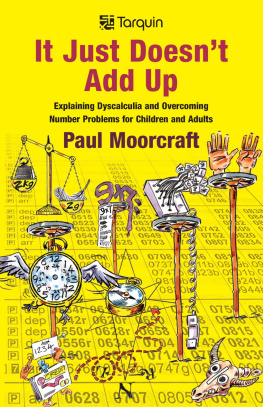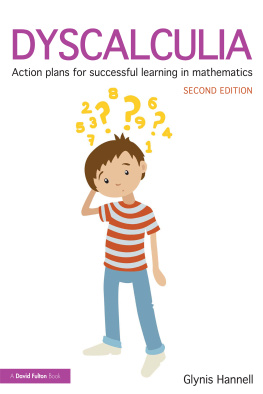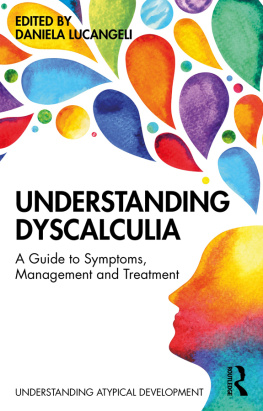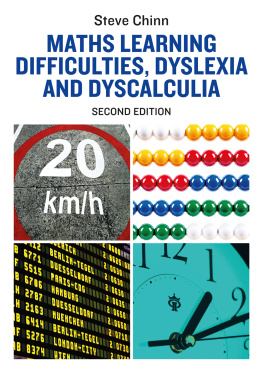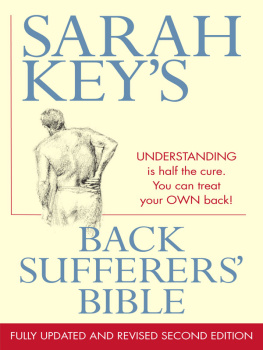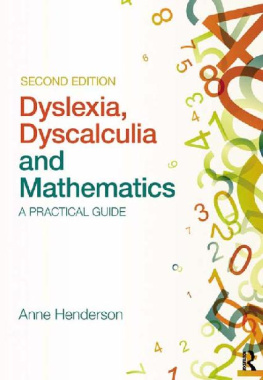It Just Doesnt Add Up
It Just Doesnt Add Up
Explaining Dyscalculia and Overcoming
Number Problems for Children and Adults
Paul Moorcraft
It Just Doesnt Add Up
For more information on dyscalculia please visit
www.dyscalculiasupportcentre.com
Published by
Tarquin
Suite 74, 17 Holywell Hill, St Albans
AL1 1DT, UK
Telephone (+44) 01727 833866
Fax (+44)0845 456 6385
www.tarquingroup.com
For many ways to make mathematics fun
Professor Paul Moorcraft 2014
The right of Professor Paul Moorcraft to be identified as the author of this work has been asserted by him in accordance with the Designs and Copyright Act 1988. Reprinted 2015.
Paperback ISBN 978-1-911093-00-8
Ebook ISBN 978-1-911093-01-5
Printed by TJ International Ltd, Padstow, Cornwall, UK
This book is subject to international copyright and may not be copied in any way without the prior written permission of the publishers.
For Jenny
Foreword
I met Paul when Marinella Cappelletti and I were carrying out a study of high-functioning dyscalculics. We wanted to find out why they were so bad at arithmetic, while being so good at other things. We also wanted to know how they managed to be successful in this highly numerate society, since there was abundant evidence that people who are really bad with numbers are more likely to have low educational attainment, more likely to be unemployed, more likely to in trouble with the law and more likely to be mentally or physically ill. We tested film directors, Tv producers, actors, even a distinguished science journalist. Paul fitted the bill perfectly. Extremely high-functioning. He had, as he quickly pointed out, published more books than me, taught at more universities, and was certainly better-known. On formal testing, however, his numerical skills were a disaster. I couldnt understand how he came to be admitted to university, which required O-level maths when he was a student - with no exceptions. On the basis of our tests, he must surely have failed. Fortunately, in those days the exam curriculum contained more geometry, and it turned out that he was good enough at geometry to scrape a pass. This confirmed my hunch that dyscalculia was crucially about numbers, not about maths more generally. Indeed, I have met world-class mathematicians whom I have reason to believe are dyscalculic. Of course, they dont work in number theory, but in branches more suited to their abilities, such as geometry.
Our high-functioning dyscalculics enabled us to pinpoint the exact cognitive deficits underlying dyscalculia, precisely because they were high-functioning. We could rule out deficits in intelligence (they were all highly intelligent), in memory (they all had good short-term and long-term memories), of education (they were all well-educated), of language abilities (most had written books or presented Tv or radio programmes) and ambition (they were all highly successful in their occupations). They also helped us pinpoint the brain network that was abnormal when they were working with numbers.
Paul kindly agreed to take part in our study, which, naturally, meant endless hours doing exactly the kind of things he hated-comparing numbers, remembering numbers, adding and subtracting numbers, and so on.
He also wanted to help with our project of making the disorder better known. This is tremendously important. Around five percent of the population suffer from dyscalculia, and most are seriously handicapped by their disability. Although its comparable in its prevalence with dyslexia, it is far less widely recognized. As the Governments Chief Scientific Officer, Sir John Beddington, wrote in 2008, Dyscalculia is currently the poor relation of dyslexia, with a much lower public profile. But the consequences of dyscalculia are at least as severe as those for dyslexia. This message has not penetrated the minds of the current government, alas. If you search on the Department for Education website, all you get is a reference to a 2001 document that, you are warned, does not represent government policy.
Up until he met us, Paul had managed to keep his disability a secret-counting on his fingers under the table at board meetings when millions of pounds were at stake - because it could cause difficulty and embarrassment in his working life. But now he was prepared to come out as dyscalculic to help the cause, and he has appeared on radio and TV, and in the press, to show that dyscalculia, though disabling, neednt prevent the sufferer being a success in life.
This book will, I believe, help to raise the profile of dyscalculia, and should be required reading for all sufferers, all parents of sufferers, and all teachers, not to mention ministers and officials in the Department for Education.
Brian Butterworth
Emeritus professor of cognitive neuropsychology in the Institute of Cognitive Neuroscience at University College, London October 2013
CONTENTS
About the author
Paul Moorcraft has been a life-long sufferer from acute dyscalculia, and has been recorded as having one of the lowest adult scores in numerical ability in the UK. Nevertheless, he has achieved a great deal (though very rarely in maths). He studied at a variety of universities: Swansea, Lancaster, the Hebrew University, Jerusalem, the University of Rhodesia/Zimbabwe and the University of South Africa, obtaining, inter alia, a BA (Joint Honours), MA and D Litt et Phil. He was awarded a rare double distinction in his post-graduate education certificate while training to be a teacher at Cardiff University. Although he has taught in schools and worked as an examiner for the Joint Matriculation Board in the UK, he has worked mainly at tertiary level: teaching, full-time, politics, international relations, history and journalism at the universities of Rhodesia/Zimbabwe, Natal, the Witwatersrand, Cape Town, Deakin (Australia), Waikato (New Zealand), Bournemouth, and Cardiff; he also taught part-time at the Open University and Westminster University. He was a visiting professor at Baylor University, Texas, and is a visiting professor at the School of Journalism, Media and Cultural Studies at Cardiff University.
In addition, he has worked for many of the major TV networks as an independent producer, making over 100 broadcast documentaries, most recently for Channel Four News. Besides editing a number of business and security magazines, he was a special correspondent for Time magazine in Africa, and writes regular opinion pieces for the quality newspapers in the UK, US and South Africa, as well as being a political pundit for BBC radio and TV, Sky TV and Al-Jazeera. He has worked in over 30 conflict zones as a war correspondent. Also, he has been a senior instructor at the Royal Military Academy, Sandhurst, and the UKs Joint Services Command and Staff College, as well as being an inmate of the Ministry of Defence in Whitehall.
He writes two to three books a year on military history, crime, politics, travel and international relations, as well as being an award-winning novelist. His most recent non-fiction works are: Inside the Danger Zones (2010), The Rhodesian War (2011)

